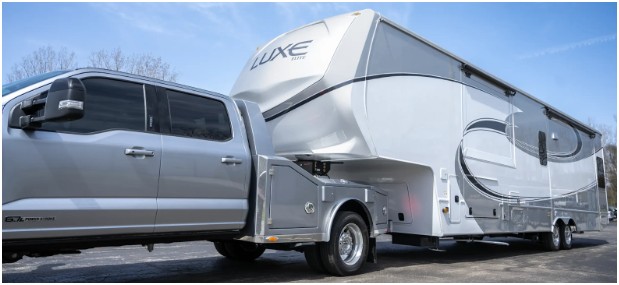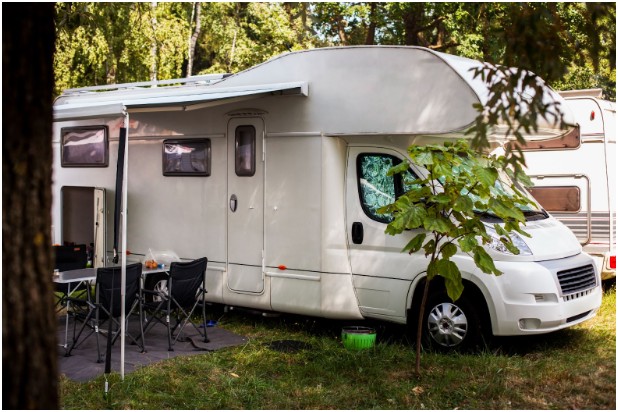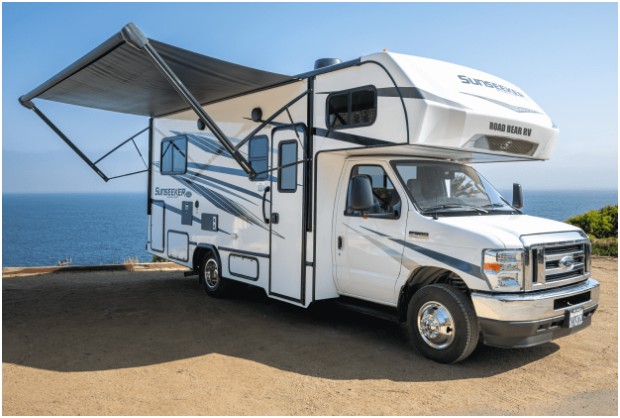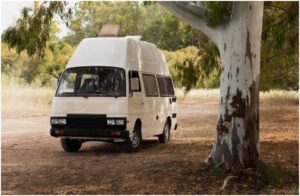Choosing the best RV to live in full time isn’t just about square footage or luxury finishes—it’s about finding the right fit for your lifestyle, travel goals, and daily needs. Whether you’re a solo traveler chasing the open road or a couple looking to downsize, the ideal RV should support your version of home, wherever you park it.
Below, we’ll explore the most popular RV types for full-time living, what makes each unique, and what you should consider before committing.
Fifth Wheels

Fifth wheels are a favorite among full-timers for their home-like comfort and spacious designs. These towable RVs are hitched over the rear axle of a pickup truck, which offers better stability and weight distribution.
Image Source: Luxe Fifth Wheel
Why They’re a Top Choice:
- Residential-style living with high ceilings and open layouts
- Often include multiple slide-outs for added space
- Many models come with dedicated bedrooms, large bathrooms, and even washer/dryer setups
Notable Models:
- Keystone Montana – Known for residential comfort and solid build quality
- Grand Design Solitude – Offers luxury interiors and high insulation for year-round living
- Jayco North Point – Balances price with upscale features
Ideal for: Couples or families who want a spacious, semi-permanent home base with the option to travel.
Class A Motorhomes
These large, bus-shaped RVs deliver top-tier comfort and convenience, making them one of the most luxurious options for full-time living.
Standout Features:
- Everything is accessible while driving, including the kitchen and bathroom
- High storage capacity, large holding tanks, and full residential appliances
- Often equipped with king beds, slide-outs, and premium finishes
Popular Picks:
- Newmar Dutch Star – Diesel-powered with high-end craftsmanship
- Tiffin Allegro Bus – Spacious and stylish with dependable performance
- Entegra Aspire – Luxury comfort with modern design
Ideal for: Full-time RVers who prioritize maximum comfort, long-haul travel, and luxury features.
Travel Trailers

Travel trailers are versatile, widely available, and generally more affordable than other RV types. They come in a range of sizes—from compact to spacious family-friendly options.
Why Consider One:
- Towable with a standard SUV or truck depending on the size
- Wide variety of floor plans, including bunkhouses and office setups
- More flexibility to unhitch and use your vehicle independently
Recommended Models:
- Airstream Classic – Durable and timeless, with sleek aluminum exteriors
- Grand Design Imagine – Well-insulated and designed for longer stays
- Forest River Cherokee – A budget-friendly option with practical features
Ideal for: Families or part-timers transitioning into full-time RV living.
Class C Motorhomes

Built on a truck or van chassis, Class C RVs are smaller than Class A but often more manageable for new RVers.
Image Source: Road Bear RV
Key Advantages:
- Over-cab sleeping area or storage
- Easier to drive and park than Class A models
- Often priced in the mid-range while still offering full amenities
Reliable Options:
- Jayco Redhawk – Great for entry-level full-time RVers
- Forest River Sunseeker – Available with four-season packages
Ideal for: Small families, couples, or solo travelers seeking a balance of mobility and comfort.
Class B Camper Vans

Class B RVs, or camper vans, are compact and perfect for those who prefer mobility over space. They’re increasingly popular among digital nomads and solo travelers.
Why They Work for Full-Timers:
- Easiest to drive and park, even in cities or remote areas
- Often include solar panels, composting toilets, and convertible sleeping spaces
- Excellent for stealth camping and off-grid living
Great Picks:
- Winnebago Solis – Practical layout with rooftop sleeping
- Roadtrek Zion Slumber – Includes all the essentials in a sleek build
Ideal for: Solo travelers or couples who travel light and move often.
Best RVs for Full-Time Living
When it comes to full-time RV living, comfort, space, and reliability are key. Below are the top RV models you should consider for your long-term lifestyle on the road.
-
Winnebago Minnie Winnie
This Class C motorhome is perfect for those looking for a spacious and reliable vehicle with all the amenities of home. It offers ample storage, a full kitchen, and a comfortable living area.
Pros: Affordable, versatile, reliable.
Cons: Slightly smaller than Class A motorhomes. -
Airstream Classic
Renowned for its sleek design and durability, the Airstream Classic is an iconic RV for those seeking a long-term home on wheels. With luxurious finishes and spacious interiors, this RV is built for full-time living.
Pros: High-quality build, great for long-term durability.
Cons: Expensive. -
Grand Design Reflection
Ideal for families or couples, this 5th-wheel RV offers a home-like feel with plenty of space, including a residential kitchen and full bathroom.
Pros: Spacious, luxurious, excellent insulation for year-round living.
Cons: Requires a truck for towing.
What to Consider Before Choosing Your Full-Time RV
Finding the best RV to live in full time involves more than picking a floor plan. You need to think about how you’ll actually live day-to-day.
Space Requirements
Ask yourself:
- Do you need a dedicated workspace?
- Will pets or kids be living with you?
- Are you comfortable with compact, efficient designs, or do you need room to stretch out?
Towing and Driving Experience
Towable RVs (like fifth wheels and travel trailers) require a capable vehicle and towing know-how. Motorhomes (Class A, B, and C) allow easier transitions between stops but may need a separate towed car (toad) for daily errands.
Power and Off-Grid Capabilities
If you’re considering boondocking or off-grid stays, make sure your RV has:
- Solar panels and lithium batteries
- Inverter systems
- Larger fresh water and waste tanks
- Efficient heating and cooling systems
Budget and Maintenance
Consider both the upfront cost and long-term expenses:
- Insurance, registration, and taxes
- Campground fees or lot rent
- Routine maintenance and repairs
- Fuel consumption
How to Choose the Best RV to Live in Full Time
Before buying, rent different RV types to see what works for your lifestyle. Try platforms like RVshare or Outdoorsy for short-term test runs.
When visiting dealerships or browsing listings:
- Walk through the space and picture your daily routines
- Ask about insulation, weight limits, and manufacturer warranties
- Inspect for build quality, storage space, and layout flow
Take your time. This is your home—not just your vehicle.
How Much Does It Cost to Live in an RV Full-Time?
Living in an RV full-time is an affordable alternative to traditional housing, but it requires budgeting for several key factors:
-
RV Purchase: Between $30,000 to $150,000+ depending on the model.
-
Monthly Expenses:
-
Gas: $300–$600
-
Campsite Fees: $500–$1,000
-
Insurance: $100–$300
-
-
Maintenance: $500–$1,000 annually.
Overall, full-time RV living costs can range from $2,000 to $4,000 per month, depending on your RV type, lifestyle, and travel plans.
The Best RV for Full-Time Living: Key Features to Consider
When selecting an RV for full-time living, look for these essential features:
-
Space & Layout: Choose a model that provides enough room for daily activities and storage.
-
Insulation & Weather Resistance: Consider RVs that are well-insulated, especially if you plan to travel year-round.
-
Reliability & Durability: Opt for a model that is built for long-term use, with high-quality materials and construction.
Frequently Asked Questions
1. Can you live in an RV full-time?
Yes, full-time RV living is a growing lifestyle choice, offering freedom and flexibility. It requires the right RV and planning, but it is practical for those who want to live on the road.
2. How much does it cost to live in an RV full-time?
Living in an RV full-time can cost anywhere from $2,000 to $4,000 per month, depending on the RV model and associated living expenses like gas, maintenance, and campsite fees.
3. How do you live in an RV full-time?
Living full-time in an RV involves selecting the right RV model, budgeting for maintenance and campsite fees, and knowing where to park your RV for extended stays.
4. Is living in an RV year-round practical?
Yes, living in an RV year-round is practical with the right model, such as a Class A motorhome or 5th-wheel RV. Insulation and space are key factors to ensure comfort in all seasons.
5. What type of RV is best suited for full-time living?
The best RVs for full-time living include Class A motorhomes, 5th-wheel RVs, and Class C RVs. These models offer the space, durability, and amenities needed for long-term living.
Conclusion: Which RV is Best for Full-Time Living?
At the end of the day, the best RV to live in full time is the one that fits your lifestyle, comfort needs, and budget. Whether you’re drawn to the space of a fifth wheel, the luxury of a Class A, or the nimbleness of a van, your RV should feel like home—because it will be.
Start slow, do your research, and don’t be afraid to test the waters with a rental. The right RV will support your version of freedom, wherever the road takes you.

